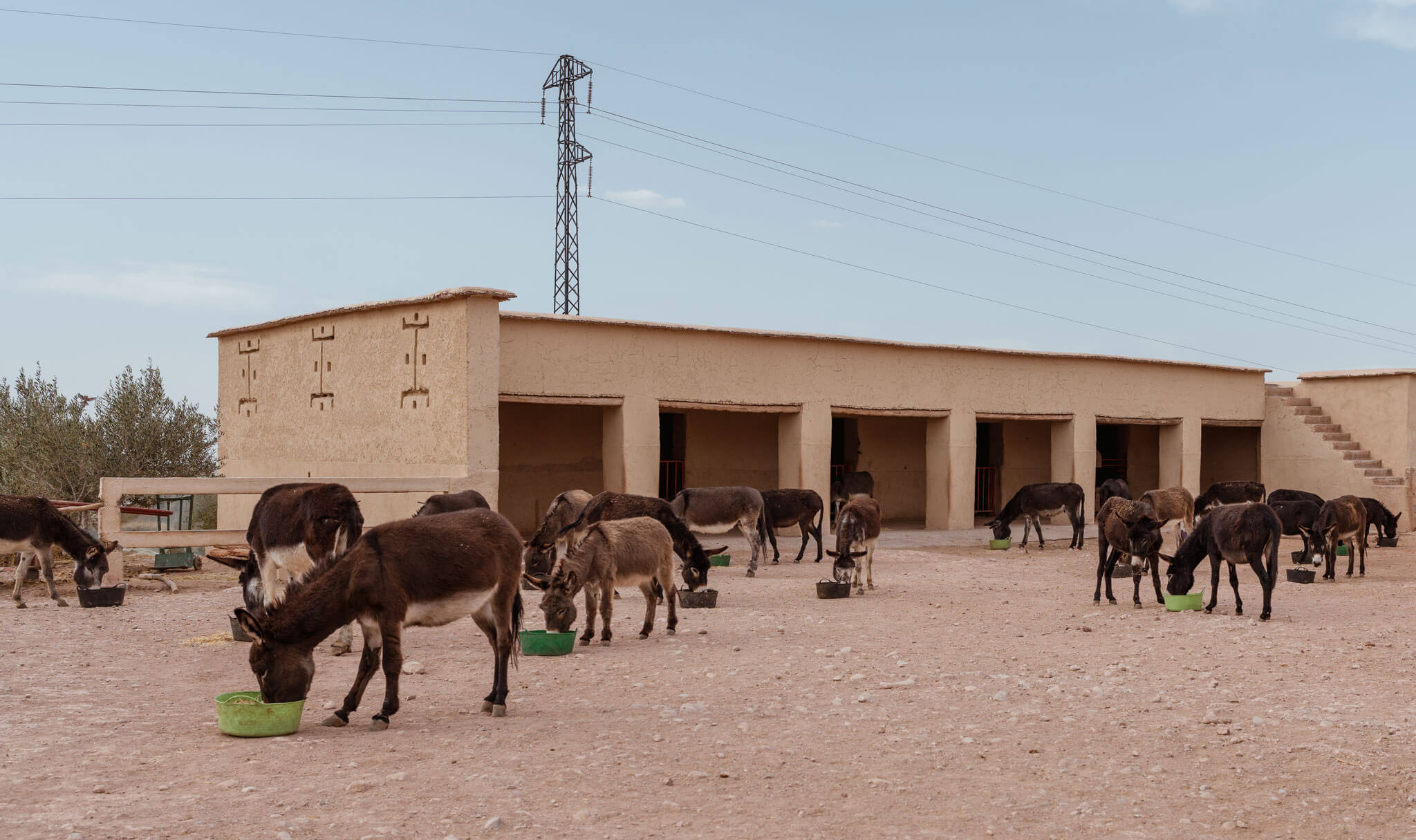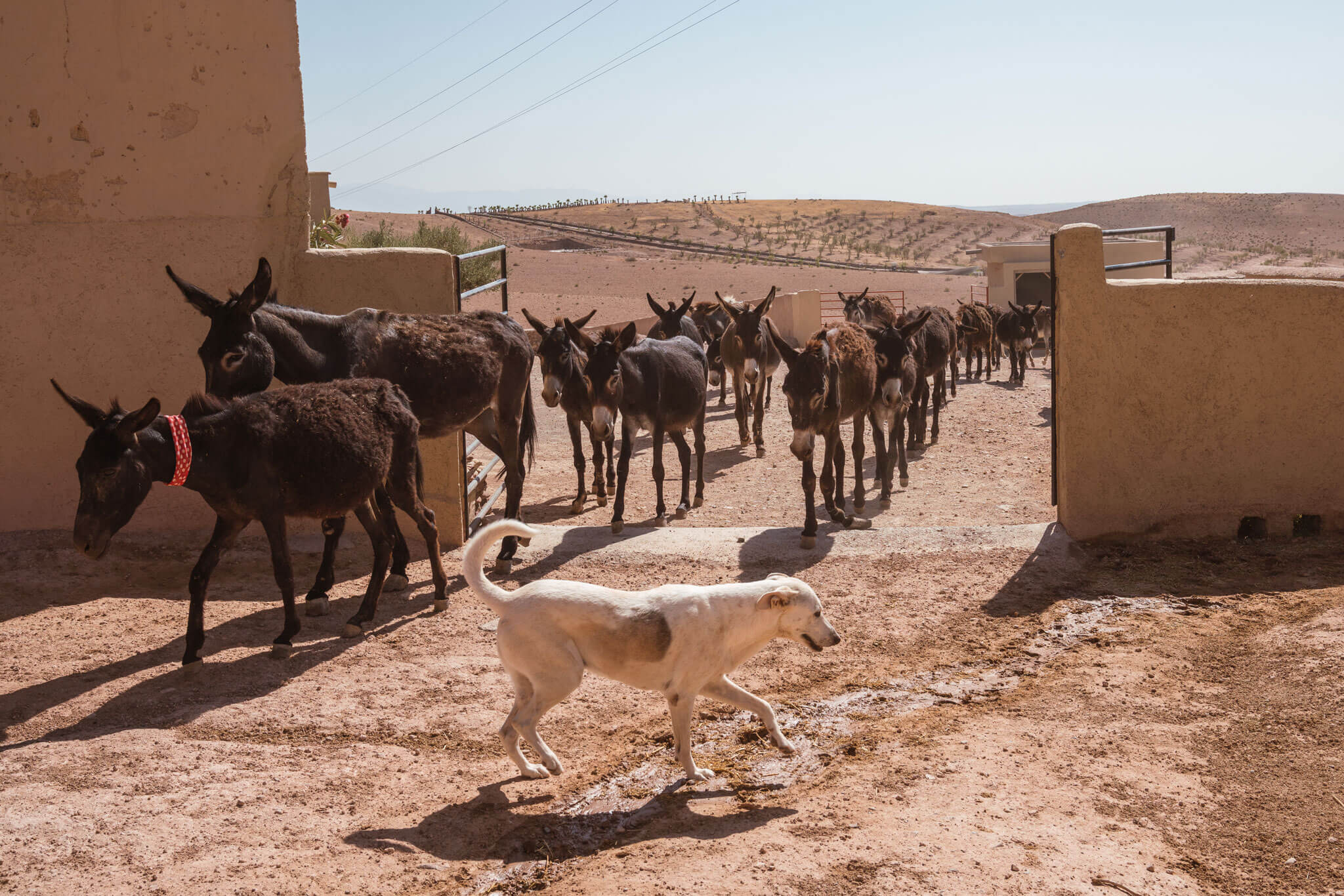Jarjeer | A Place of Hope

Drive south of Marrakech along dusty roads for about half an hour and you’ll find a sanctuary for Morocco's working animals in which donkeys, mules, and horses are able to roam free and feast on alfalfa in their twilight years.
Donkeys (and other equines) play an important role in everyday life in Morocco. They’re used to transport goods and people in both cities and rural areas. But too often, they’re also neglected and forced to survive in dire conditions. Many are malnourished and must scour through trash for food. Some suffer from untreated open wounds and injuries, and are forced to work until they collapse.

Jarjeer employs a team of 14 people from their local village of Oumnass who work tirelessly around the clock to ensure that the animals they rescue are taken care of. Machin credits them for the sanctuary’s success. The staff feeds the animals four times a day and are also responsible for dressing their wounds, assessing their health, and cleaning their stables daily. The Jarjeer team is also always ready to take action in case of an emergency – such as receiving a call about a donkey that’s been abandoned in the streets and needs to be transported to receive medical attention.
“Yes, the work is emotionally draining and exhausting at times,” Machin admits. “But I do believe that as lawyers, we’re psychologically attuned to ongoing pressure and dealing with the problems quickly as they arise. Neither of us have ever been frightened of hard work. And at the end of the day, however hard we have to work, we are privileged to live in a place as beautiful as Morocco.”
Hantom echoes his wife’s sentiment. “If there’s one thing we can say about this place, it’s that this is a place of hope,” he says. “This is a place that changes lives.”
Machin agrees: “It certainly changed our lives.
Jarjeer Mule and Donkey Refuge was founded in 2014 by Susan Machin and her husband Charles Hantom, both of whom were lawyers in the United Kingdom before they decided to purchase land and retire in the Moroccan countryside. The couple initially took in one donkey as a way of helping out a local animal rescue organisation, but over time, the number of equines (and dogs) grew. There are now more than 250 animals living on Machin and Hantom’s property, and the pair have found themselves spending their retirement in charge of one of Morocco’s leading non-profit animal welfare organisations. They have no regrets.
“For us, it’s an easy concept,” Machin says. “I was a human rights lawyer and Charles was a trade union lawyer. It’s a part of our DNA that we treat all beings as equals and with respect.”
“For us, it’s an easy concept,” Machin says. “I was a human rights lawyer and Charles was a trade union lawyer. It’s a part of our DNA that we treat all beings as equals and with respect.”
Donkeys (and other equines) play an important role in everyday life in Morocco. They’re used to transport goods and people in both cities and rural areas. But too often, they’re also neglected and forced to survive in dire conditions. Many are malnourished and must scour through trash for food. Some suffer from untreated open wounds and injuries, and are forced to work until they collapse.

Jarjeer employs a team of 14 people from their local village of Oumnass who work tirelessly around the clock to ensure that the animals they rescue are taken care of. Machin credits them for the sanctuary’s success. The staff feeds the animals four times a day and are also responsible for dressing their wounds, assessing their health, and cleaning their stables daily. The Jarjeer team is also always ready to take action in case of an emergency – such as receiving a call about a donkey that’s been abandoned in the streets and needs to be transported to receive medical attention.
“Yes, the work is emotionally draining and exhausting at times,” Machin admits. “But I do believe that as lawyers, we’re psychologically attuned to ongoing pressure and dealing with the problems quickly as they arise. Neither of us have ever been frightened of hard work. And at the end of the day, however hard we have to work, we are privileged to live in a place as beautiful as Morocco.”
Hantom echoes his wife’s sentiment. “If there’s one thing we can say about this place, it’s that this is a place of hope,” he says. “This is a place that changes lives.”
Machin agrees: “It certainly changed our lives.
Words and Photography: Erika Hobart














